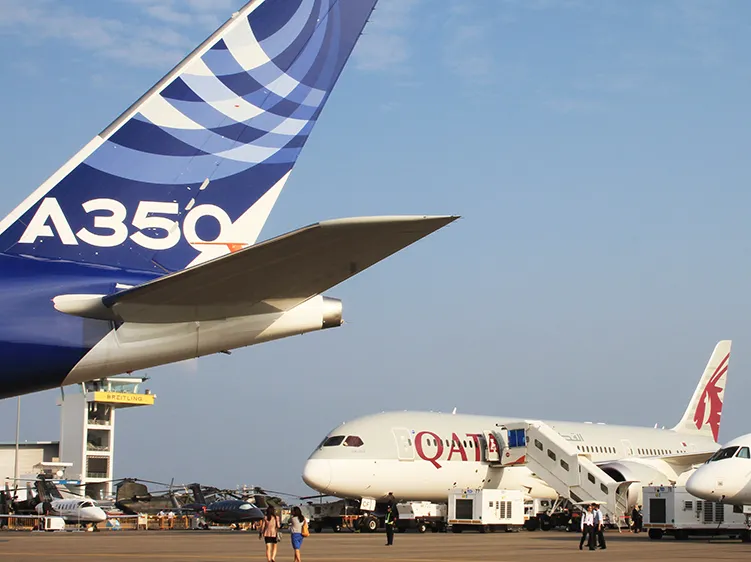
Boeing and Airbus: Clearing the air
Feb 09, 2020

Boeing and Airbus are two leading giants in the aerospace industry, known for their fierce competition and innovative advancements in commercial aviation. Boeing, an American company, has a long history dating back to 1916, renowned for iconic aircraft like the 747 and 787 Dreamliner. Airbus, a European manufacturer founded in 1970, has made its mark with models such as the A320 and A380. Both companies continually strive to enhance fuel efficiency, safety, and passenger comfort while navigating challenges like market fluctuations and environmental regulations. Their rivalry not only shapes the aviation landscape but also drives technological progress within the industry.
The aviation industry has long been dominated by two major players: Boeing and Airbus. These two manufacturing giants have consistently been at the forefront of innovation and competition, shaping the future of air travel. As they continue to evolve, understanding their strategies and products has become increasingly important for stakeholders in the aviation sector.
The Competitive Landscape
In recent years, the rivalry between Boeing and Airbus has intensified. While each company has its strengths, they also face unique challenges. Boeing, known for its long-range aircraft like the 777 and 787 Dreamliner, has been striving to recover from setbacks, including production issues and safety concerns. Conversely, Airbus has gained market share with its A320 family and the A350, emphasizing efficiency and passenger comfort.
Market Share Analysis
The competition between Boeing and Airbus is reflected in their respective market shares. According to recent data, Airbus has captured a significant portion of the single-aisle market, particularly with its A320neo series. On the other hand, Boeing remains a strong contender in the wide-body segment.
| Company | Market Share (2023) | Key Aircraft Models |
|---|---|---|
| Boeing | 44% | 777, 787 Dreamliner |
| Airbus | 56% | A320neo, A350 |
This market share data highlights the competitive dynamics at play and underscores the importance of innovation and customer service in securing contracts. Airlines are increasingly looking for fuel-efficient options that also enhance the passenger experience.
Innovation and Technology
Both Boeing and Airbus have made substantial investments in research and development to stay ahead in the industry. Boeing's focus on composite materials and advanced aerodynamics has resulted in lighter, more fuel-efficient aircraft. The 787 Dreamliner, for example, boasts a 20% improvement in fuel efficiency compared to similar-sized models.
Airbus, on the other hand, has leveraged its experience in digital technology and automation. The A350 incorporates advanced materials and systems that contribute to reduced operational costs. Furthermore, Airbus has actively pursued sustainable aviation initiatives, including the development of hydrogen-powered aircraft.
Sustainability Efforts
As global awareness of environmental issues grows, both Boeing and Airbus are stepping up their sustainability efforts. Airlines and consumers alike are demanding greener solutions, prompting these manufacturers to explore alternative fuels and more efficient designs.
For instance, Boeing is investing in sustainable aviation fuels (SAF) and has committed to achieving net-zero carbon emissions by 2050. Similarly, Airbus has announced ambitious plans to introduce zero-emission aircraft by 2035, reflecting its commitment to sustainability.
Global Impact and Future Outlook
The impact of Boeing and Airbus extends beyond just the aircraft they produce. Their operations influence global trade, employment, and technological advancements. As they continue to innovate, the future of air travel looks promising, with both companies vying to lead the charge towards a more sustainable and efficient aviation industry.
Looking forward, analysts predict that the demand for air travel will rebound post-pandemic, leading to increased orders for new aircraft. This resurgence presents an opportunity for both Boeing and Airbus to expand their fleets and enhance their offerings. However, they must remain vigilant in addressing challenges such as supply chain disruptions and fluctuating fuel prices.
Conclusion
In conclusion, the rivalry between Boeing and Airbus is a pivotal aspect of the aviation industry. Their ongoing competition drives innovation, shapes market trends, and ultimately benefits consumers. As they navigate the complexities of the market, both companies must remain committed to sustainability and technological advancement to meet the evolving demands of the aviation sector.
As the landscape continues to shift, stakeholders should keep a close eye on developments within these two aerospace titans. The future of air travel hinges on their ability to adapt and lead in an ever-changing environment.
Related Articles

Explore Thailand: The Best Islands to Visit for Paradise, Adventure, and Relaxation

The Ultimate Guide to the Best Islands in Thailand for Your Next Getaway

Do babies need passports? How to get a passport for a newborn

How to get a U.S. passport fast: here’s how to expedite the process

What is Mobile Passport Control: 5 reasons why you should use it

SENTRI vs. Global Entry: A detailed guide

Do you need a passport to go to the Bahamas? Let’s find out

Do you need a passport to go to Mexico? A detailed guide

Do you need a passport to go to Canada? We got the answer

Do You Need a Passport for a Cruise: An Essential Travel Guide

Booster Seat Requirements: All the Rules to Follow in Your Rental Car

What Are the World’s Most Powerful Passports, and How Does Yours Rank?

How to Take a Passport Photo at Home: A Helpful Guide

You've got to have heart! Southwest's new livery

Your opinion: Should water be free on low cost carriers?

Young women bolder than guys as solo travellers
